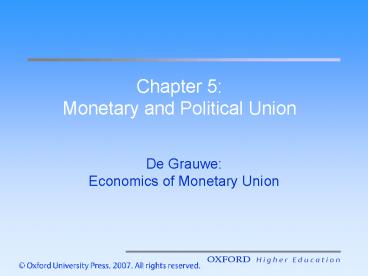Chapter 5: Monetary and Political Union - PowerPoint PPT Presentation
1 / 15
Title:
Chapter 5: Monetary and Political Union
Description:
Executive branch (Commission and the Council) Legislative branch (Council and the European Parliament) Judicial branch (Court of Justice) ... – PowerPoint PPT presentation
Number of Views:21
Avg rating:3.0/5.0
Title: Chapter 5: Monetary and Political Union
1
Chapter 5Monetary and Political Union
- De Grauwe
- Economics of Monetary Union
2
Introduction
- Two schools of thought
- Monetary union cannot survive in the long run
without a strong political union - The present degree of political unification
reached in the EU is sufficient to guarantee the
long run survival of the monetary union - The debate is made difficult by a lack of clarity
about the meaning of political union - There are many dimensions and many gradations of
political union
3
The many dimensions of a political union
- There is an institutional dimension. The EU has
developed a whole set of institutions to which
the member states have delegated part of their
national sovereignty - Executive branch (Commission and the Council)
- Legislative branch (Council and the European
Parliament) - Judicial branch (Court of Justice)
- EU has all the institutions of a modern
democracy, capable of taking decisions with
direct impact at the national level - In this sense there is already a significant
degree of political union within the EU
4
- There is a functional dimension
- The transfer of sovereignty has been very unequal
- Transfers are important in some area
(agriculture, foreign trade, competition) - Few or no transfers in the areas of government
spending and taxation, social policies, wage
policies
5
- The question that arises is what areas are
important for a monetary union - Do we need a transfer of sovereignty in all these
areas so that the European institutions become
the embodiment of a true superstate, or can
this transfer be selective? - If the latter is true, what principles should be
followed to allocate responsibilities between the
union and the member-states? - In order to answer these questions we turn to the
theory of optimal currency areas
6
The theory of optimal currency areas and
political union
- There is no supranational coercive power that can
force the member states to stay in the monetary
union - Therefore, for the Eurozone to survive, the
member states must continue to perceive their
membership to be in their national interest - If that is no longer the case, the temptation to
secede will exist and at some point this
temptation may lead to secession
7
- What kind of governance of the union can ensure
that countries willingly stay in the union? - Put differently, what is the nature of the
political union that can maintain the
cohesiveness of the monetary union? - We turn to the OCA-theory to answer these
questions
8
Political union in the OCA-theory
- OCA-theory has been used almost exclusively to
analyze whether countries should join a monetary
union - It can also be used to study the conditions in
which existing members of a monetary union will
want to leave the union - OCA-theory says that if the benefits of the
monetary union exceed the costs, member countries
have no incentive to leave the union. They form
an optimal currency area
9
- The conditions that guarantee that monetary union
is optimal and thus sustainable have been
analyzes in previous chapters - They can be summarized by three concepts
- Symmetry
- Flexibility
- Integration
10
- How does political union affect this cost benefit
analysis? - Two channels of influence
- Political union makes it possible to organize
systems of fiscal transfers that provide some
insurance against asymmetric shocks - Political union reduces the risk of asymmetric
shocks that have a political origin (e.g. shocks
in government spending and taxation social
policies, wage policies)
11
Political union affects OCA-analysis
symmetry
- Assume that Eurozone is on borderline of OCA-zone
- When political union becomes more intense
- OCA-line shifts to the left (more redistribution)
- Eurozone shifts upwards (more symmetry)
- Countries in Eurozone have weaker temptation to
leave the union - The Eurozone becomes more sustainable
OCA-zone
Eurozone
OCA
flexibility
12
- We conclude that in order to enhance the
sustainability of a monetary union it is
important to have a central budget that can be
used as a redistributive device between the
member states - This does not have to be a a full fiscal union
- The latter would produce too many moral hazard
problems - Some limited transfers as proposed by von Hagen,
Mélitz and others
13
- It also matters to have some form of coordination
of those areas of national economic policies that
can generate asymmetric macroeconomic shocks - See previous discussion on increasing divergences
in the Eurozone - Due to divergent wage policies
14
An omitted deep variable
- The German monetary union was part of a larger
political union - This political union came about as a result of a
strong national sense of common purpose and an
intense feeling of belonging to the same nation - This deep variable is weakly developed at the
European level - It is this weak presence of the deep variable
that makes the progress towards political union
so difficult in Europe
15
Conclusion
- The long run success of the Eurozone depends on
the continuing process of political unification - Such a political unification is needed to reduce
the scope for the emergence of asymmetric shocks
and to embed the Eurozone in a wider system of
strong political ties - These are needed to take care of the inevitable
divergent economic movements within the Eurozone































